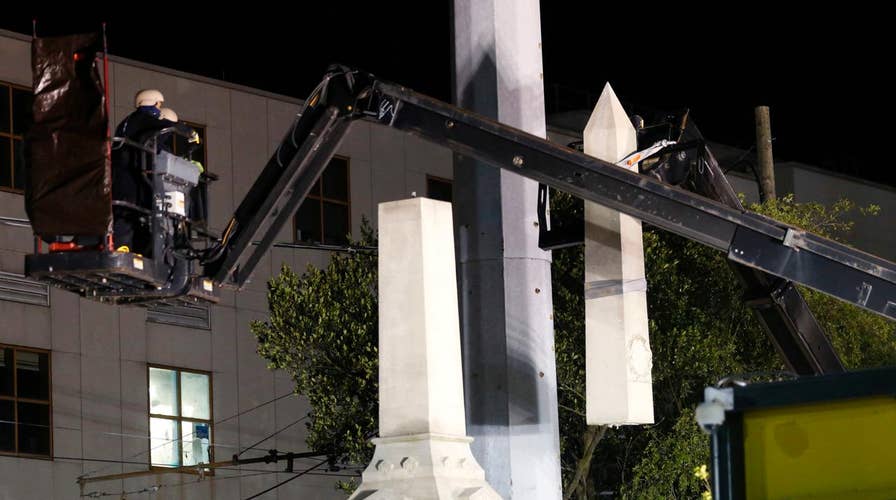New Orleans Confederate memorial removed in dead of night
Removal of four Confederate monuments begins in New Orleans under cloak of darkness
Last week, Biloxi, Miss. became the latest Southern city to order the removal of a state flag containing the Confederate Army emblem from the city’s public properties.
According to the Sun Herald, 5.7 million people per year visit Biloxi, and city spokesman, Vincent Creel, said he supported the order and hopes it will convey a positive message to tourists. "We don't think we should give them [potential visitors] any reason to reconsider their decision to visit our community," he said.
Tourism to Mississippi’s gulf coast makes up one-third of the state’s tourism revenue. It's also a thriving, $1.6 billion dollar industry, according to the Biloxi Area Tourism Industry Report. Harrison County, which includes Biloxi, was specifically responsible for $77 million in 2010—30 percent of the state’s tourism capital investment.
The Mayor of Biloxi, Andrew “FoFo” Gilich, ordered the removal of the flag on Confederate Memorial Day.
DESPITE TRAVEL WARNINGS, MEXICO KEEPS CLIMBING TOURIST DESTINATION RANKINGS
There’s a precedent for states to potentially lose tourism dollars as a result of unpopular legislation. According to an Associated Press report, North Carolina’s so-called “bathroom bill” will cost the state more than $3.76 billion in lost revenue.
According to NPR, Mississippi is the only remaining Southern state with Confederate imagery in their flag. The upper left corner features the Confederate battle emblem.
During a keynote address at the Moss Point-Jackson County NAACP Freedom Fund Banquet last week, Sirius XM radio commentator Joe Madison called for a new Mississippi state flag—one without the Confederate emblem.
“Do you really want to maintain that emblem as your symbol in this modern world?” Madison said.
LAS VEGAS AFTER DARK, COUNTRY STAR STYLE
But Biloxi isn't the only city to remove symbols of the old South recently. Last week—the same day the Gulf Coast city removed its flags—New Orleans took down the Liberty Monument, which commemorated whites who tried to topple a biracial Reconstruction-era government.
The Mayor of New Orleans, Mitch Landrieu, called the Liberty Monument “offensive” while talking to Fox News and said it was built to “revere white supremacy.” He continued, "if there was ever a statue that needed to be taken down, it's that one.”
Social media captured the intense police presence during the nighttime removal of the Liberty Monument.
Heavy #NOPD presence outside of Liberty Monument. Police Captain says heavy equipment coming through. @FOX8NOLA pic.twitter.com/msYDCpytQb
— Rob Krieger (@Rob_Krieger) April 24, 2017
Men with helmets and what appears to be bullet proof vests tearing away crumbling sign on Liberty Monument. @FOX8NOLA pic.twitter.com/As2HcDruLe
— Rob Krieger (@Rob_Krieger) April 24, 2017
And not everybody is pleased with the removals of the Confederate flag from historic monuments.
"It makes me mad that part of history is being torn down," Nola.com reported a “Confederate flag-waving protester” as saying.
FOLLOW US ON FACEBOOK FOR MORE FOX LIFESTYLE NEWS
Others took to Twitter to voice their disapproval of the spate of removals. “Before it was the confederate flag it was the Mississippi flag. So now Mississippi has no flag. Has been taken down every where.”
— Beer Whisperer PhD😍 (@philadper2014) May 1, 2017
The comment was in response to another user’s tweet of a skull emblazoned with a Confederate flag that said “I am a Confederate. I have the right to fly my flag. Your approval is not required.”
Conservative web magazine The Federalist argues that the monuments and flags shouldn't be taken, for their historic value. “The case for keeping our Confederate monuments has everything to do with preserving our history, the better to understand it,” John Daniel Davidson noted.
“Something as central to American history as the war between North and South should impose on us and demand our attention—not so that we can honor the principles of the Confederacy, but so we can understand and remember who we were and all we suffered to survive the Civil War and remain one nation,” the piece continued.
“At a time when the divisions in our country are deepening, and Americans are sorting themselves into increasingly hostile factions, we could do worse than to gaze on Confederate statues, contemplate their reasons for fighting, and consider what it took to put the country back together.”

